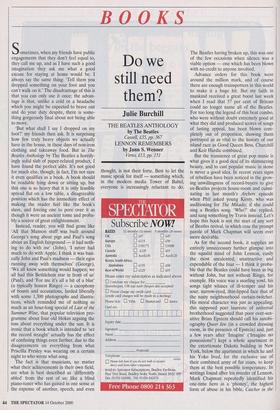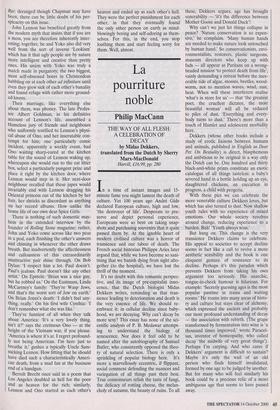BOOKS
Do we still need them?
Julie Burchill
Sometimes, when my friends have public engagements that they don't feel equal to, they call me up, and as I have such a good imagination they ask me what a good excuse for staying at home would be. I always say the same thing: 'Tell them you dropped something on your foot and you can't walk on it.' The disadvantage of this is that you can only use it once; the advan- tage is that, unlike a cold or a headache which you might be expected to brave out and do your duty despite, there is some- thing gorgeously final about not being able to move.
`But what shall I say I dropped on my foot?' my friends then ask. It is surprising how few truly heavy objects we actually have in the house, in these days of non-iron clothing and takeaway food. But in The Beatles Anthology by The Beatles a horrify- ingly solid slab of paper-related product, I have found the perfect alibi. It's not good for much else, though; in fact, I'm not sure it even qualifies as a book. A book should be readable lying down or sitting up, but this one is so heavy that it is only feasible spread flat on a low table, a disagreeable position which has the immediate effect of making the reader feel like the book's slave, and forcing one to pore over it as though it were an ancient tome and proba- bly a source of great enlightenment.
Instead, reader, you will find gems like `All that Manson stuff was built around George's song about pigs and Paul's song about an English fairground — it had noth- ing to do with me' (John), I never had much to do with Apple. I think it was basi- cally John and Paul's madness — their egos running away with themselves' (George), `We all knew something would happen; we all had this Bethlehem star in front of us' (Paul), and 'For me it's all a bit of a blur' (a typically honest Ringo) — a cacophony of boasts and accusations, larded liberally with some 1,300 photographs and illustra- tions, which reminded me of nothing so much as an hour-long special of Last of the Summer Wine, that popular television pro- gramme about four old blokes arguing the toss about everything under the sun. It is ironic that a book which is intended to 'set the record straight' actually has the effect of confusing things even further, due to the disagreements on everything from what Priscilla Presley was wearing on a certain night to who wrote what song.
The fact is that musicians, no matter what their achievements in their own field, are what is best described as 'differently abled' from the rest of us; like a blind piano-tuner who has gained in one sense at the expense of another, speech, and even thought, is not their forte. Best to let the music speak for itself — something which, in the modern media Tower of Babel, everyone is increasingly reluctant to do. The Beatles having broken up, this was one of the few occasions when silence was a viable option — one which has been blown with no credit to anyone involved.
Advance orders for this book were around the million mark, and of course there are enough trainspotters in this world to make it a huge hit. But my faith in mankind received a great boost last week when I read that 57 per cent of Britons could no longer name all of the Beatles. For too long the legend of this beat combo, who were without doubt extremely good at what they did and produced scores of songs of lasting appeal, has been blown com- pletely out of proportion, showing them portrayed as as vital to the history of our island race as Good Queen Bess, Churchill and Keir Hardie combined.
But the transience of great pop music is what gives it a good deal of its shimmering beauty, and to cast popular music in stone is never a good idea. In recent years signs of rebellion have been noticed in the grow- ing unwillingness of record-buyers to give ex-Beatles projects house-room and culmi- nating in last month's Archers episode when Phil asked young Kirsty, who was auditioning for The Mikado, if she could sing a Beatles song. 'Who?' she replied, and sang something by Travis instead. Let's hope this book is not the start of any sort of Beatles revival, in which case the prompt parole of Mark Chapman will seem ever more desirable.
As for the second book, it supplies an entirely unneccessary further glimpse into the squalid mind of John Lennon, easily the most untalented, unattractive and expendable of the four — I think it proba- ble that the Beatles could have been as big without John, but not without Ringo, for example. His voice was a snarling yowl, his songs tight whines of ill-temper and his sour, narrow-eyed, thin-lipped face that of the nasty neighbourhood curtain-twitcher. His moral character was just as appealing; this supposed poet laureate of universal brotherhood suggested that poor over-sen- sitive Brian Epstein should call his autobi- ography Queer Jew (in a crowded dressing room, in the presence of Epstein) and, just a few years after 'Imagine' (Imagine no possessions?') kept a whole apartment in the extortionate Dakota building in New York, below the apartment in which he and his Yoko lived, for the exclusive use of their combined army of fur coats, to keep them at the best possible temperature. In writings found after his murder of Lennon, Mark Chapman repeatedly identified his one-time hero as a 'phoney', the highest form of abuse in his bible, Catcher in the Rye: deranged though Chapman may have been, there can be little doubt of his per- spicacity on this issue.
John Lennon has benefited greatly from the modem myth that insists that if you are a mess, you are therefore inherently inter- esting; together, he and Yoko also did very well from the sort of inverse `Lookism' which has it that ugly people are by nature more intelligent and creative than pretty ones. His union with Yoko was truly a match made in purgatory; the two biggest, most self-obsessed bores in Christendom babbling on at each other ad infinitum until even they grew sick of each other's banality and found refuge with rather more ground- ed lovers.
Their marriage, like everything else about them, was phoney. The late Profes- sor Albert Goldman, in his definitive account of Lennon's life, assembled a blameless jury of friends and neighbours who uniformly testified to Lennon's physi- cal abuse of Ono, and her inscrutable con- tempt for him; one particularly comic incident, apparently a weekly event, had Ono waiting sharp-eared at the kitchen table for the sound of Lennon waking up, whereupon she would run to the cat litter box, select a particularly pungent prize and place it right by the kitchen door, where Lennon would step in it. Her next-door neighbour recalled that these japes would invariably end with Lennon dragging his Oriental princess out of the kitchen by her hair, her shrieks as discordant as anything on her record albums. How unlike the home life of our own dear Spice Girls.
There is nothing of such domestic may- hem in the extended interview by the founder of Rolling Stone magazine; rather, John and Yoko come across like two peas in a pod, each finishing the other's answers and chiming in whenever the other draws breath. But inadvertently the affectlessness and callousness of this extraordinarily unattractive pair shine through. On Bob Dylan: 'I respect him a lot. Paul doesn't. Paul's jealous. Paul doesn't like any other artist.' On Epstein: 'Brian was a nice guy, but he robbed us.' On the Eastmans, Linda McCartney's family: 'They're Wasp Jews, and that's the worst sort of Jew on earth.' On Brian Jones's death: 'I didn't feel any- thing, really.' On his first wife Cynthia: 'I don't remember what she was like.'
They're funniest of all when they talk about America: 'It's a very lovely thing, isn't it?' says the cretinous Ono — at the height of the Vietnam war, if you please. `America is where it's at. I regret profound- ly not being American. I'm here just to breathe it,' gushes a typically Uncle Sam- sucking Lennon. How fitting that he should have died such a characteristically Ameri- can death, from a mad fan at the business end of a handgun.
Bertolt Brecht once said in a poem that Los Angeles doubled as hell for the poor and as heaven for the rich; similarly, Lennon and Ono started as each other's heaven and ended up as each other's hell. They were the perfect punishment for each other, in that they eventually found the only other person on earth as mind- blowingly boring and self-adoring as them- selves. For this, in the end, you stop loathing them and start feeling sorry for them. Well, almost.



















































































 Previous page
Previous page